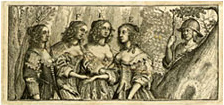Thomas Hoby, The Courtier (1561)
Full Text
Not available
EEBO/TCP
Not available
Date
15610
Book title
The Covrtyer
Publication place
London
Printer
William Seres
Transcription source
EEBO/TCP
Text type
printed book
Genre
Other
Subject area
Italian
Summary
A letter from Sir John Cheke on the English language (zz5).
Language
headwords: English
explanations: English
explanations: English
explanations: English
explanations: English
Word-group
type: other
Word-entry
type: other
sample: A Letter of syr I. Cheekes. ¶ To his louing frind Mayster Thomas Hoby. FOr your opinion of my gud will vnto you as you writ, you can not be deceiued: for submitting your doinges to mi iudgement I thanke you: for taking this pain of your translation, you worthilie deserve great thankes of all sortes. I haue taken sum pain •• your request cheflie in your preface, not in the reading of it for that was pleasaunt vnto me boath for the roundnes of your saienges and welspeakinges of the saam, but in changing certein wordes which might verie well be let aloan, but that I am verie curious in mi freendes matters, not to determi•n, but to debaat what is best. Whearin, I seek not the bestnes haplie bi truth, but bi mijn own phansie, and shew of goodnes. I am of this opinion that our own tung shold be written cleane and pure, vnmixt and vnmangeled with borowing of other tunges wherin if we take not heed bi tijm, euer borowing and neuer payeng, she shall be fain to keep her house as bankrupt. For then doth our tung naturallie and praisablie vtter her meaning, whan she bouroweth no conterfeitness of other tunges to attire her self withall, but vseth plainlie her own, with such shift, as nature, craft, experiens and folowing of other excellent doth lead her vnto, and if she want at an• tijm •as being vnperfight she must) yet let her borow with suche bashfulnes, that it mai appeer, that if e•t•er t•e •o•ld of our own tung could serue vs to falcion a woord of our own, or if the old denisoned wordes could content and ease this neede, we wold not boldly venture of vnknowen wordes This I say not for reproof of you, who haue scarslie and necessarily vsed whear occasion serueth a strange word so, as it seemeth to grow out of the matter and not to be sought for: but for mijn own defens, who might be counted ouerstraight a deemer of thinges, if I gaue not thys accompt to you, mi freend and wijs, of mi marring this your handiwork. But I am called awai, I prai you pardon mi shortnes, the rest of mi saienges should be but praise and exhortacion in this your doinges, which at 〈…〉 I shold do better. From my house in Woodstreete the 16▪ of Iuly, 1557. Yours assured Ioan Cheek.
sample: A Letter of syr I. Cheekes. ¶ To his louing frind Mayster Thomas Hoby. FOr your opinion of my gud will vnto you as you writ, you can not be deceiued: for submitting your doinges to mi iudgement I thanke you: for taking this pain of your translation, you worthilie deserve great thankes of all sortes. I haue taken sum pain •• your request cheflie in your preface, not in the reading of it for that was pleasaunt vnto me boath for the roundnes of your saienges and welspeakinges of the saam, but in changing certein wordes which might verie well be let aloan, but that I am verie curious in mi freendes matters, not to determi•n, but to debaat what is best. Whearin, I seek not the bestnes haplie bi truth, but bi mijn own phansie, and shew of goodnes. I am of this opinion that our own tung shold be written cleane and pure, vnmixt and vnmangeled with borowing of other tunges wherin if we take not heed bi tijm, euer borowing and neuer payeng, she shall be fain to keep her house as bankrupt. For then doth our tung naturallie and praisablie vtter her meaning, whan she bouroweth no conterfeitness of other tunges to attire her self withall, but vseth plainlie her own, with such shift, as nature, craft, experiens and folowing of other excellent doth lead her vnto, and if she want at an• tijm •as being vnperfight she must) yet let her borow with suche bashfulnes, that it mai appeer, that if e•t•er t•e •o•ld of our own tung could serue vs to falcion a woord of our own, or if the old denisoned wordes could content and ease this neede, we wold not boldly venture of vnknowen wordes This I say not for reproof of you, who haue scarslie and necessarily vsed whear occasion serueth a strange word so, as it seemeth to grow out of the matter and not to be sought for: but for mijn own defens, who might be counted ouerstraight a deemer of thinges, if I gaue not thys accompt to you, mi freend and wijs, of mi marring this your handiwork. But I am called awai, I prai you pardon mi shortnes, the rest of mi saienges should be but praise and exhortacion in this your doinges, which at 〈…〉 I shold do better. From my house in Woodstreete the 16▪ of Iuly, 1557. Yours assured Ioan Cheek.
STC
4778




